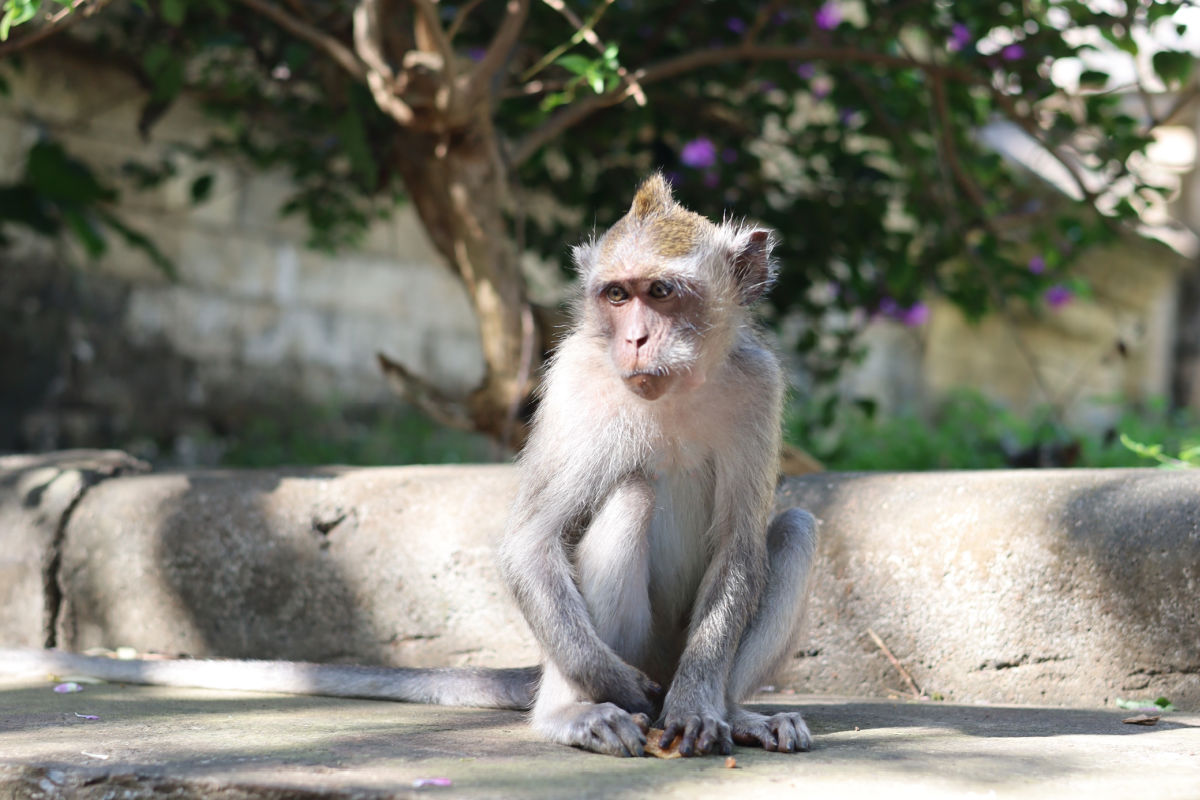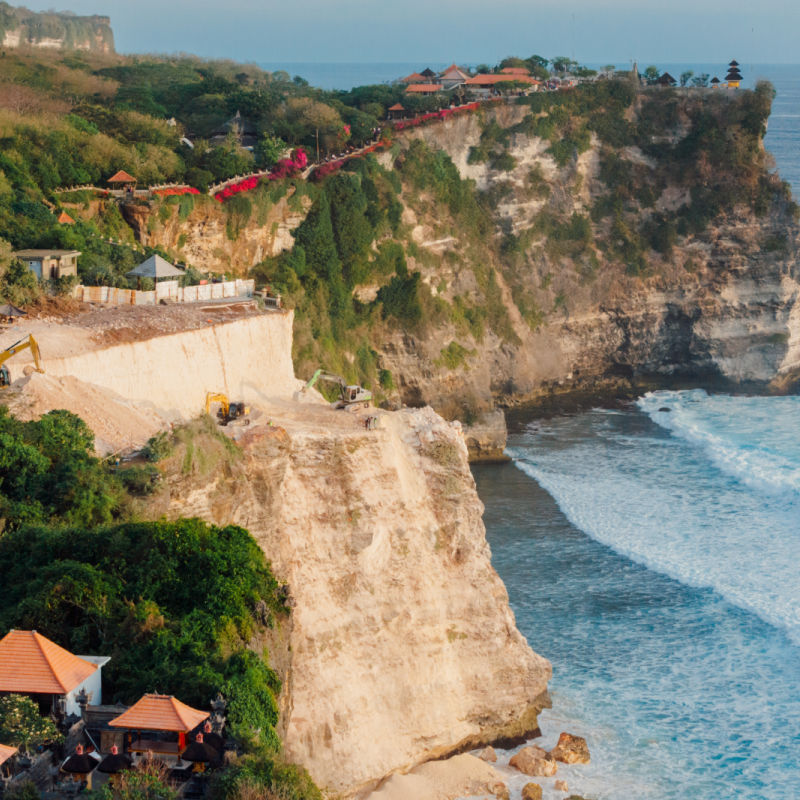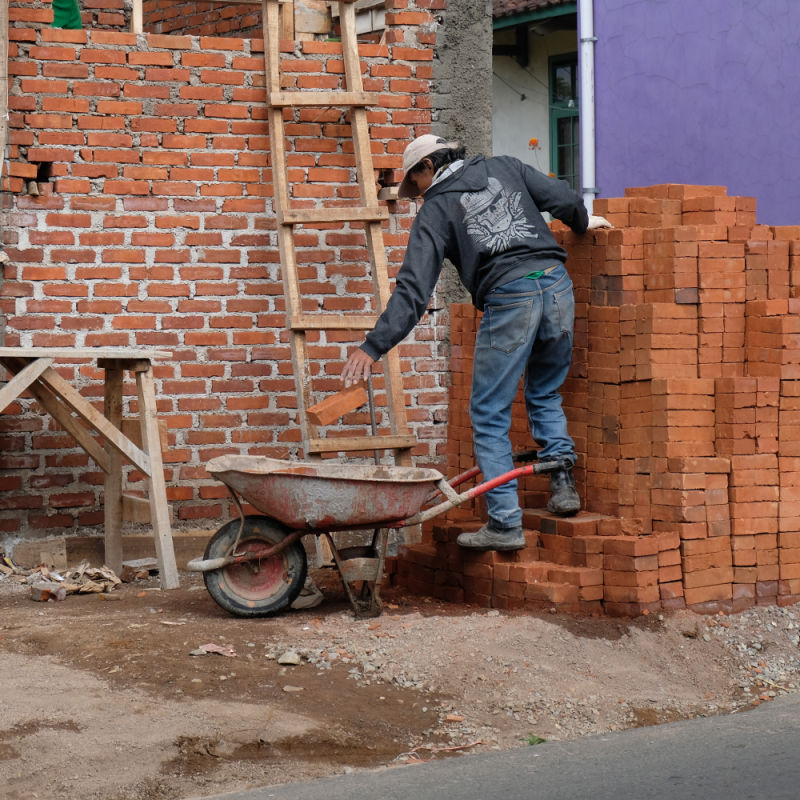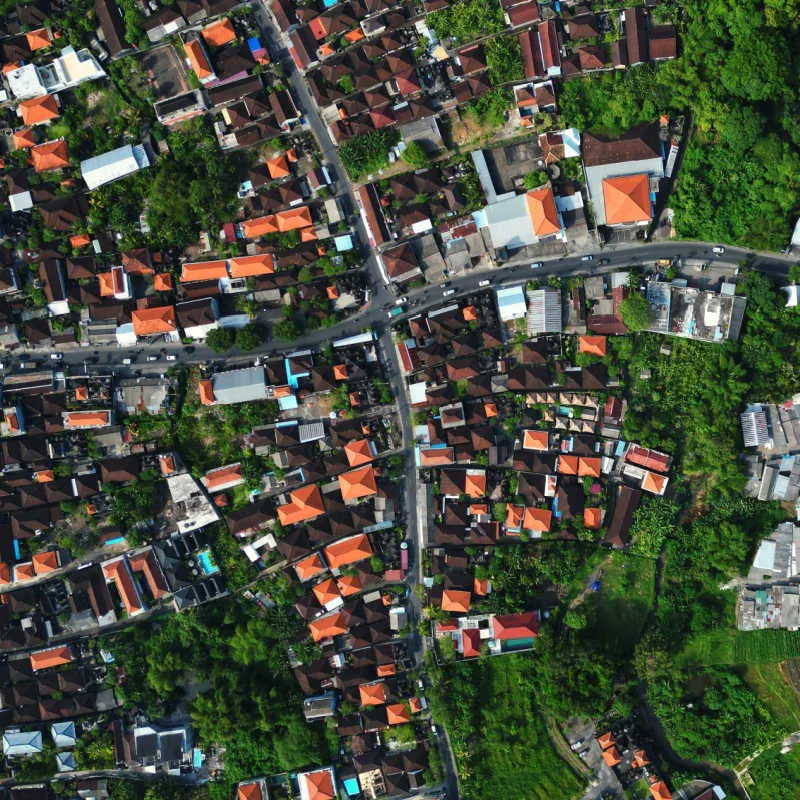It is no secret that rapid tourism development is impacting Bali’s environment. From the conversion of rice paddies into villa complexes to coastal cliffside into expansive resorts, aerial views of Bali are changing at an unprecedented pace.
Rapid development is impacting not only the landscape and lives of local people but also wildlife.

Monkeys are among the species worst affected by the rapid development of tourism and commercial properties along the south coast of Bali.
The famous macaques of Uluwatu are being displaced as bulldozers excavate the landscape to make way for construction, encroaching upon and, in some cases, totally destroying their natural habitat and home range.
Tio Russ, a prominent animal welfare advocate in Bali, has been sharing footage online of her efforts to help provide food for wild monkeys displaced by construction and development work in the Uluwatu area.
Russ and her community are now supporting up to ten monkey troops in the Bukit area, whose nesting trees and home range have been destroyed in the name of tourism development.
In a social media post Russ can be seen throwing kilos of food out to the wild monkeys who have little other sustenance available to them. Russ explains that she’s delivered 150kg of jicama, known locally as bongkwong, as well as fifteen sacks of bananas and 15kg of peanuts.
She’s been calling on the local community to donate leftover fruit in order to prevent the organic waste from going to landfills and support wildlife in need.
While there are always concerns regarding interacting and intentionally feeding wildlife, animal welfare advocates like Russ feel that it is their moral duty to care for wildlife negatively impacted by habitat degradation.
Many feel that if the monkeys aren’t cared for in what natural habitat they have left, that they will have no option but to move closer to communities and steal food where they can.
Many residents and local leaders in Bali are concerned that the rapid conversion of land from wild landscapes and agricultural land into commercial and tourism properties has been undertaken without due consideration for the long-term impacts on the land and, in turn, the local communities and wider ecosystems.
There are fears that many projects in Bali have been given the go-ahead without in-depth environmental impact assessments or sufficient focus on reducing environmental harm.

A new bill is expected to be brought into effect this month, banning new tourism developments in many areas of South Bali.
Yet many fear the moratorium is too little, too late, with dozens of luxury 5-star hotels, resorts, and villas already being constructed and set to start development over the next three years.
The moratorium is expected to ban new projects, not halt those that have already been granted permission.
The General Manager of Nanau Property Group, Evgeny Obolentsev, told reporters that as demand for travel in Bali continues to increase, so too will interest from property developers.
He explained, “This, of course, gives a significant boost to the growth of the property industry in Bali, especially the construction of villas and hotels to accommodate the increase in tourist visits to Bali.”

He noted that areas such as Seseh, Kedungu, and Cemagi are the next big destinations of interest for developers. Over the last five years, developers have focused on Canggu, Uluwatu, and the communities on the outskirts of Ubud.
Obolenstev affirmed the need for consideration and balance in future developments across the province.
He told reporters, “What is needed is balance, how to keep Bali a tropical paradise for tourists, without sacrificing nature and culture that has existed for thousands of years. Thus, zoning becomes very crucial so that there is no overlap in land allocation, which can eventually harm all parties involved.”

He reiterated the developers must act responsibly when creating new projects in Bali, adding, “What is no less important is how we as developers can build properties in harmony with the surrounding nature and Balinese culture itself. The reason is that nature and culture are part of the concept of residential development itself.”
Remove All Ads & Unlock All Articles… Sign up for The Bali Sun Premium

Plan Your Bali Holiday:
Book The Best English Speaking Drivers For Airport Transfers & Tours
Choose From Thousands of Bali Hotels, Resorts, and Hostels with Free Cancellation On Most Properties
Book Cheap Flights To Bali
Don’t Forget Travel Insurance That Covers Medical Expenses In Bali
For the latest Bali News & Debate Join our Facebook Community
SUBSCRIBE TO NEW POSTS
Enter your email address to subscribe to The Bali Sun’s latest breaking news, straight to your inbox.
Discover more from The Bali Sun
Subscribe to get the latest posts sent to your email.

Randy
Friday 18th of October 2024
Speechless !!!
J West
Friday 18th of October 2024
And BTW…you know what’s going to happen when you habituate monkeys to a constant human food source don’t you? Here in Thai we had a famous flare up of habituated monkeys in a mid-sized city called Lop Buri.
The monkeys took over entire buildings and formed into several violent organized gangs. One building, an ex-movie theater was a real life “Planet of the Apes” scene where worker crews would fan out to break into homes, rob passers by, attack children with school lunches and loot shopping laden house wives.
That’s what you can expect if you habituate monkeys. Lob Buri city had to effect a large cull of thousands of soldier monkeys, it wasn’t pretty.
Exp
Friday 18th of October 2024
Not only wildlife affected by out of control developments. According to news locals complains about both Finns and Atlas disturbing their beachside ceremonies at Berawa with fireworks and loud music.
Finns apparently had their fireworks go off in the middle of a ceremony despite request from locals to postpone. Excuse was that their guests was waiting for the fireworks. Ref link below.
It is a disgrace how these beach clubs cause so much disturbance outside the land perimeter to their premises. They rent or buy a piece of land then they ruin the lives for people over the whole area.
LINK
Rusty212
Friday 18th of October 2024
Having lived in Bali since 2001,how's the concerns of a property developer relevant.Sure some new dwellings are eco efficient.They still consume vacant land, so they are also responsible for the over tourism problems.Being selfish here, they have left our beautiful Nth Bali untouched....🙏😊
Steve b
Saturday 19th of October 2024
@Rusty212, let's keep north bali quiet 👌🙏
J West
Friday 18th of October 2024
Mad Monkeys are the tip of the iceberg. I’ve written extensively on the subject of the development massacre over many years, to no avail. It’s not just monkeys and sleep deprived buffalo in the noise and development grinder, it’s lizards, bats, night birds , Balis many species of rodents, large and small domestic mammals, snakes , insects of every order etc etc ad nauseum dead dead dead…never to return. You people are perpetrating a mass kill of every living thing. it’s a genocide. Shame on you for not considering the ecological impact.
Sven
Saturday 19th of October 2024
@J West, Tri Hita Karana something something..
Balinese always yapping about different things, while doing the opposite.